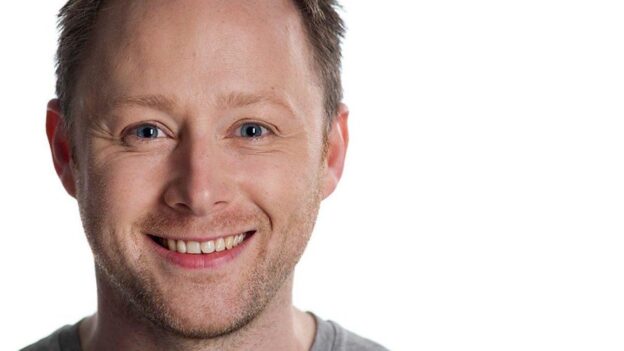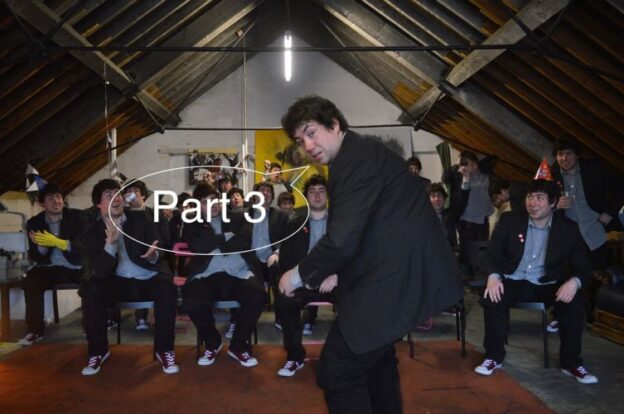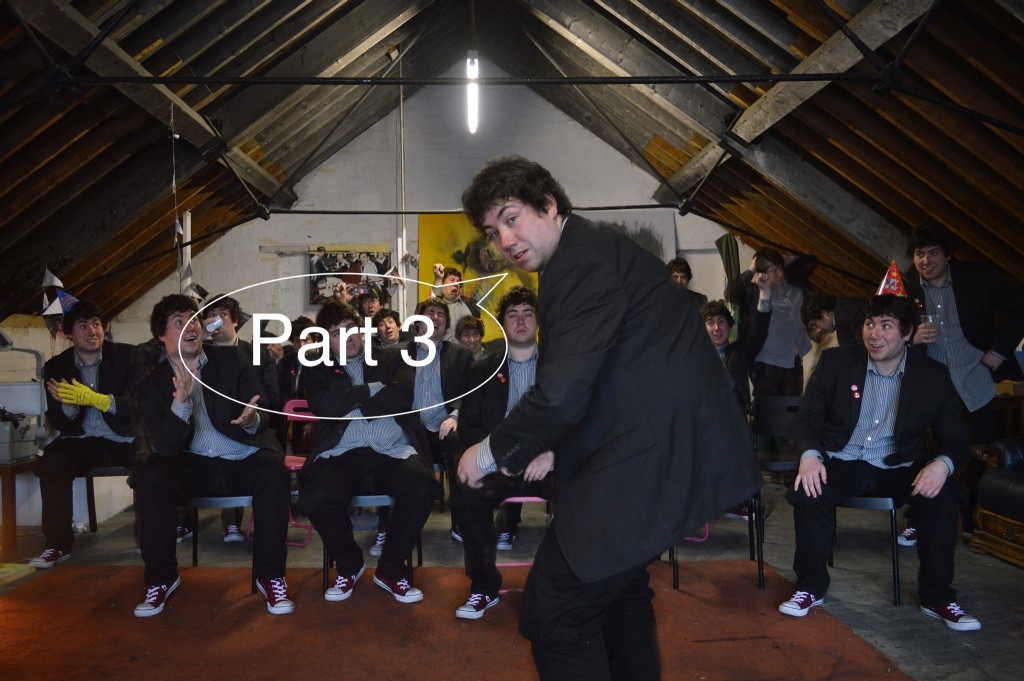Helping you to understand and appreciate the Liverpool accent and Scouse English, featuring clips of comedy a short history of Liverpool and interviews with famous footballers, actors and musicians.
![]()
[DOWNLOAD]
Transcript – Introduction
Hello listeners – how are you doing? In the last episode we listened to some comedy routines by Scouse comedian John Bishop and I said we’d take a closer look at the Liverpool accent, break it down, listen to some more samples and also learn some typical words you might hear being used in Liverpool. So that’s the plan in this episode. All about the Liverpool accent.
There’s nowhere in the UK quite like Liverpool. You probably know it as where The Beatles came from, or because of the football clubs LFC and EFC. Perhaps some of you have visited it or studied there are students, because it’s a big university town.
I lived there for 4 years as a student.
My feelings when I moved there:
It’s definitely in the north! Up north.
First time I lived in the north, and there is a north/south divide in the UK
Climate is different
People are different to the people anywhere else – they’re cheeky, chatty, tough, humourous, a bit tricky sometimes, proud and also quite sentimental and sensitive about the city.
The place has a particular history that isn’t shared by other towns in England. Its cultural mix is different to the rest of the country. The accent in particular is very distinctive, and it’s confined to just the local Liverpool area – a relatively small space when you consider the accent diversity in other larger countries where the same accent may be heard for many miles, like for example in Texas. In England our accents are very specific and very local. Travel 30 minutes by car from Liverpool to neighbouring Manchester and the accent is very different and this is largely because of the history of Liverpool as an international port and the rich diversity of influences.
This is a corner of the country with a strong character and a recognisable accent to go along with it.
Scousers, or people from Liverpool are instantly recognisable by their accent. The sound of a Liverpool accent instantly conjures up certain images, certain cliches, certain reference points and a certain history which is unique to that part of the country.
In this episode the plan is to investigate the Liverpool accent, and to some extent the dialect, listen to some samples, find out some of the pronunciation features, and consider a little bit of Liverpool’s history and culture. We’ll listen to a few different people speaking in a Liverpool accent and I’ll help you to understand it all, and I’m sure you’ll pick up some nice vocabulary on the way – and not just local slang words but words that everybody in the country uses but which the Scousers might just pronounce in their own way.
The aim is to broaden your horizons, broaden your exposure to different accents and to help you get a full appreciation of English in all its forms.
The Milk Advert on TV
Let’s start with an advert that used to be on the TV and which millions of British people watched many times – The famous milk advert.This is what the whole nation (of my generation) might think of as a sample of Scouse English. Many of us heard it lots of times growing up and a lot of us even learned it. I used to be able to recite it word for word when I was a kid.
Picture two children from Liverpool who have been playing football in the garden. They come into the house to get something refreshing to drink from the fridge (or should that be “fridge”). One asks for lemonade, the other one chooses to drink milk because it’s “what Ian Rush drinks”.
Ian Rush was a famous footballer in the 80s. He played for Liverpool for years and scored many goals for them. He was Welsh. By the way, you should also know that there is a place in England called “Accrington” (north of Manchester) and their football team (Accrington Stanley) aren’t very good – so Accrington Stanley is a reference for an unknown football team that nobody wants to play for.
Audio sample 1 – The Milk Advert
Lee Mack making fun of the Scouse accent
Features of the Liverpool Accent
Let’s now take a closer look at the Liverpool accent, considering some of the main features that make Scouse English different to the kind of RP that I speak. Then we’ll listen to some more samples of Scouse speech and you can see if you understand them.
Consonant sounds
- /k/ can become /x/ like in “loch” “Accrington Stanley” “milk” “Lee Mack”
- /r/ sounds – alveolar tap “accrington stanley” “I’m afraid I’m not from round here” “alright”
- /t/ can sound like /s/ “butter” “I’m going to go into town later, do you want something” “Come on then mate, let’s start. Come ed, Let’s get started.”
- /g/ is pronounced not just with the /ŋ/ but all the way to a /g/ sound “sing” “singer” “Ere mate are you a singer? You gonna sing us a song?”
- And yet sometimes it’s completely dropped like in “Eh mate what are you doing?” – “what are yew dewin? What are youse doing coming over here like that?” “Milk, that’s disgusting”
- /h/ sounds are often dropped “That has never happened to be honest”
- /d/ sounds instead of /th/ sounds – “They do though don’t they though?”
Vowel sounds
- /ɜː/ like “bird” becomes [ɛː] like “air” – “work”, “first”, “bird” “Are you always the first one to get to work in the morning”
- /a:/ sounds in the south are like /æ/ in the north (normal in the north generally) “bath” “grass” “laugh”
- But sometimes it goes wider like aaaa in “card” or “pokemon cards”
- /ʊ/ in book sounds like /u:/ “book” (but not every time – sometimes they say it like me, and words like ‘took’ and ‘look’ are often pronounced. I don’t know why it’s “book”)
- /-er/ sounds at the ends of words normally pronounced with schwa sound are pronounced with an /e/ sound “computer” “teacher” “fitter” “singer”
- /ʌ/ becomes like /ʊ/ or /ɒ/ “but erm… shut up” “shut up will ya”
- “Errrm“
- /eə/ sometimes becomes /ɜː/ – “hair” “over there”
All those features are interesting, but there’s a good chance that all just went over your head. Really the best way to get used to hearing scouse English is just to listen to some people using it.
Audio Sample 2 – Jamie Carragher “Butchers” the English Language
Just listen and tell me these things:
- Who is he?
- What’s he talking about? (general subject)
https://www.youtube.com/watch?v=nDaTTVR2JXY
Audio sample 3 – Stephen Gerrard, former England captain
- What is he looking forward to?
- Is he worried about the regime change with Fabio Cappello (known for being a discipinarian)
- Does he have a message of hope for England fans?
- What would it mean to David Beckham to achieve 100 caps?
https://www.youtube.com/watch?v=6cph2TnHW4Y
Audio Sample 4 – Wayne Gerrard – a spoof of Scouse footballers by Paul Whitehouse
Wayne Gerrard (spoof)
Language:
- Just get my head down
- Let my feet do the talking
- Very pleased for the fans
- Very pleased for the manager
- One game at a time
- Keep my head down
- Let my football do the talking
A short history of Liverpool
Liverpool is in the north west of England. It’s a port town on the river Mersey, just where the north coast of Wales meets the west coast of England.
Liverpool started as a small trading port probably in the 13th or 14th centuries.
By the 17th and 18th centuries it was the primary port for trade with Ireland. There was lots of trade with Ireland, and also ships coming from Norway and Sweden or other scandinavian countries.
The industrial revolution, globalisation and Britain’s colonialism meant that Liverpool became a hugely important port for British ships heading to the Americas in the 19th century.
As a result by the mid 19th century, Liverpool was a hugely important city for trading with the new world.
The population of the city grew quickly with amazing diversity – everyone from around the world was there, including large numbers of Irish and Welsh workers, scandinavian sailors but also Chinese workers, Caribbean workers associated with the slave trade.
Liverpool was one of the most important and most impressive cities in the world at this time.
It was sometimes called the New York of Europe, and you can see evidence of that in some of the buildings – parts of the city resemble some of the style of New York buildings, especially in the old part of town and by the docks.
The diverse history is still evident in the cultural make-up of the city. There is still a large Chinese community and also many families of Caribbean origin in parts of Liverpool.
The biggest influences though were the Welsh and certainly the Irish communities who moved in for the manual work that was available there in the 19th century. Liverpool is heavily influenced by the Irish, and it was described as the capital of Ireland just because so many Irish people lived there.
All of these influences can be heard in the Liverpool accent – some Irish, some features of Welsh (which is a totally different language to English) and also some scandinavian influences and many others that make Liverpool so different. That’s also combined with the local Lancashire accent too. All of it combines to create this particularly rich and vibrant form of English.
The city was very rich and very important during the industrial revolution, but conditions for many people were appalling – living squeezed into dirty and dangeous slums.
Gradually Britain’s position as the global industrial imperial power started slipping, and the two world wars sped up that process. Many young men were killed in World War 1, and between the two wars Liverpool was partly redesigned with many residential areas being built around the outskirts of the city, and lots of the people who previously lived in the slums being relocated there. This changed the nature of the city, with large outlying residential areas with row upon row of terraced houses.
World War 2 was devastating to Liverpool as it was the target of bombing raids by the Luftwaffe. Like many cities in the UK, Liverpool got pounded by bombs night after night and lots of buildings were destroyed, and they stayed destroyed for many years.
When the Beatles were growing up in Liverpool in the 1950s it was common for children to play in bombsites – in the remains of buildings destroyed by bombs, and even when I was living there in the 1990s I saw lots of empty spaces in residential streets where buildings used to exist but still hadn’t been replaced since the war.
With the end of the industrial revolution, Liverpool’s importance slipped and basically since WW2 Liverpool has been a rather tough place to live, with various social problems, unemployment, poverty, and perhaps the sense that the city has been somewhat ignored or forgotten by the country which used to rely on it so much.
These days the city is known for The Beatles, the football clubs and players, some cultural things such as the vibrant art scene and just the scouse people themselves who are known for their humour and their unique character.
Here’s a female voice – Jennifer Ellison, an actress from Liverpool.
Audio sample 5 – Jennifer Ellison “Mum of the Year Awards 2013”
Vocabulary
Here are some bits of the dialect or just typical sounding words.
To be honest, you hear most of these things in many parts of the country, but listen out for how scousers would say these things.
- ‘Me’ not ‘my’ – “You’ve broken all me biccies!”
- ‘You’ (plural) – ‘youse’ “Youse are all a bunch of bleedin eejits”
- Adding “me” at the end of a sentence starting with ‘I’. “I’m dead hungry, me.”
- Mate – “Alright mate, are you a student?”
- “Sound” – “He’s alright isn’t he, him? Yeah, he’s sound.”
- “Boss” – That’s boss that. Have you played FIFA. It’s boss.”
- “made up”
- “Eeeerm”
- “Eh!”
- “Alright?”
- “Laa”
- “Ta-raa”
- “See ye later”
- “Come ed”
- “Go ed” “g’wed”
- “Alright! Calm daaaawn!” (cliche)
- “Bevvies”
- “Nice one son”
- “Gutted”
- “Scran”
- “bevvie”
- “Bacon barm” – “two bacon barms please”
- “brekkie”
- “Chocka block”
- “Like” – “I was like, walking down the Scotty road and I seen these two like students.”
Lots of people in the UK got to know Scouse very well from watching Brookside, a soap opera that started in the 80s. It was about middle class and working class life in Liverpool and it often showed scenes of social problems including frequent arguments between the main characters. This helped to build the stereotype that Scousers are argumentative and prone to social problems.
Audio sample 6 – Brookside argument
Summary
- 3 people – Barry, Barry’s mum and Billy
- Barry wants his money
- But the account is £500 short
- Because his Mum lent it to someone else (Billy)
- So, let’s cut out the middle man, give us the money
- He hasn’t got it – he needed it to pay the mortgage and the car
- Barry gets angry with Billy saying “you’ve got it made here”
- Barry is angry with Billy because he’s borrowing money from his Mum
- “I’m going to have to go back to the car fella, tell him I can’t have the car”
- You’ve screwed up our Christmas!
- Then he pushes him.
Cliche
This cliche of argumentative Scousers was summed up in a series of sketches on a comedy TV show called Harry Enfield’s TV Programme.
This cemented the stereotype of Scousers as:
- Argumentative & violent – often fighting and infighting
- From large families with lots of brothers
- Always wearing shellsuits
- Unemployed – around the house all day
- With mustaches and curly permed hair
Audio sample 7 – Harry Enfield – The Scousers (the cliched view)
https://www.youtube.com/watch?v=6k2YEc6dozA
Language:
- Alright, calm down calm down.
- Are you telling me to calm down?
- Alright you two, break it up!
- What’s going on here eh?
- Friggin
- Do you have to make such a friggin fuss about it?
- Just keep out of it Barry.
- Are you telling me to keep out of it?
The Beatles
The Beatles are also famously from Liverpool, but nobody seems to really speak like them any more. The accent has become more nazal and harsher. The Beatles spoke in this kind of “Beatle voice” which you don’t hear so much any more.
You can hear the scouse in their voices though if you listen carefully.
Audio sample 8 – Beatles
Audio Sample 9 – Local documentary on YouTube
Mini doc https://www.youtube.com/watch?v=yIcPTpWq5jY



